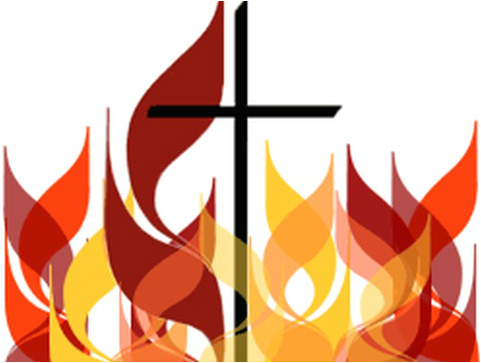|
Land developers are required to build retention ponds to receive the water runoff from the impervious surfaces they create in a new development of homes. Huge earth-moving machines come on site and dig out the soil from several acres. Landscapers then plant reeds at the edge of the area that will receive and store the water runoff. As the rain water begins to fill the depression in the ground a new environment is created. Eventually, the reeds that were planted take over the retention pond.
I recently stopped by a retention pond in Newtown that had been built several years ago. The change in the landscape caught my attention. I was interested in the new life that took up residence at the pond. I could not see any water because the reeds were so thick, but the animals that lived there showed me that it is at the base of the plants. Red wing black birds flew around the area and toads had taken up residence by the pond. God began to use this picture to make a point: When you change the topography you change the environment making it conducive for new life. How do we change the topography of our lives so that they bring down the environment of heaven? I believe it is through the things that we agree with. Our mouths are like the earth moving machines that transform the topography and, subsequently, the environment around us. Bill Johnson makes an interesting statement in the June 15 entry of his devotional, Hosting the Presence Every Day. He says that the devil "is desperately searching for open doors of agreement where he can plant and cultivate his lies." We have been given power and authority to bring the kingdom of heaven to earth. Jesus called His disciples together, and "He gave them power and authority to drive out all demons and to cure diseases, and He sent them out to preach the kingdom of God and to heal the sick." (Luke 9:1-2) Jesus modeled the way for us to defeat the enemy when He was in the wilderness. Satan tried to get Jesus to sin by presenting a twisted truth. However, Jesus knew the Word. (He is the Word!) Three times He said to Satan, "It is written," and then He declared the pure truth. The result of His declarations demonstrate how the Word of God transforms the environment. "Then the devil left Him and angels came and attended Him." (Matthew 4:11) Heaven came to earth! The Lord has put into place a process for us to follow. It starts with evaluating what is happening around us and the thoughts that enter our heads. It requires determination, patience, discernment and follow through. It is described in 2 Corinthians 10:5. "We demolish arguments and every pretension that sets itself up against the knowledge of God, and we take captive every thought to make it obedient to Christ." It is also described in James 1:19. "Everyone should be quick to listen, slow to speak and slow to become angry." After determining the godly course of action we should release the words that agree with God's Kingdom. Through this process we open the way for heaven to come to earth. We are planting Kingdom seeds and cultivating truth that grows a heavenly environment around us. Just like the earth movers change the topography so that the ground can collect the rain water, we need to use our mouths to change the topography of our lives so that we can collect the rains of heaven to grow God's Kingdom on earth.  Every earthly father has an assignment from heaven. That assignment is caring for the sons and daughters that God has given them, whether spiritual or of the flesh. Earthly fathers are to reflect the image of their heavenly Father. So much so that God even invited His children to use the same word for their earthly fathers as they call Him!
For religious Jews in the days of Jesus, hearing someone use the Hebrew word Ab or the Aramaic word Abba—meaning Daddy or Dear Father—for God would have been shocking. They were too conscious of the holiness of God and the sinfulness of human beings. Yet Jesus modeled this for them, calling God His Father when He was with them. Jesus let everyone around Him know that God is a loving, compassionate and generous Father. It is important for earthly fathers to call upon the name of the Lord for help. Being a father who reflects God's image is no easy task. Some fail. However, there is help for those who call upon the name of the Lord as described in Hebrew 4:16. "Let us then approach the throne of grace with confidence, so that we may receive mercy and find grace to help us in our time of need." All of us would do well to follow this Scripture to receive the grace and wisdom we need in order to walk out the call on our lives. Father God cares so much for us that He sent Jesus as a model of His loving care. The prayer that Jesus taught His disciples that we still pray today begins with "Our Father in heaven..." (Matthew 6:9) He also shared the story we call "The Parable of the Prodigal Son" with those who gathered around him—both sinners and self-righteous religious leaders. (The Pharisees) The father in this story demonstrated the very heart of God and spoke to both the sinners and the Pharisees. (Luke 15:11-32) The younger son took his inheritance, walked away from life with his father and entered a foreign land where he squandered his wealth. As he was filling his stomach with pods that pigs were eating "he came to his senses." Since he felt entirely unworthy to be called a son, he planned to return to his father, beg for forgiveness, and ask to be given a position as a hired man. Meanwhile, the father in the story never forgot his son and watched for him. As soon as he saw him returning he ran to him. This uncharacteristic behavior for a Middle Eastern father (lifting your robe to run and thereby exposing your legs) brought disgrace upon him. However, the loving father humbled himself in order to save his youngest son from the religious community. This community would have followed the law of Deuteronomy 21:21 and stoned the disgraceful son to death. The love of this father was demonstrated through his humility and generosity. He kissed his son, put the best rob upon him, put a ring on his finger and sandals on his feet. He then killed the fattened calf for a feast to celebrate the return of the lost son. Standing on the outside was the older brother—representing the legalistic religious society. He identified with being a slave instead of being a son and lacked understanding of the love of his father. Again, the father's response was one of humility. He left the celebration for his younger son in order to go to his older one, affirm his love for him, and extend to him undeserved grace. The father in this story represents Father God who gave His very best for His children at the expense of His own dignity. Truly, our heavenly Abba is a humble, extravagant, grace-filled, loving Father who stops at nothing to give us His best. He already gave us His best in Jesus Christ, our Savior, and continues “to do immeasurably more than we ask or imagine..." (Ephesians 3:20) He is worthy of our praise and worship and is delighted when we intentionally set aside time to spend with Him. We have entered one of the most significant times on the Hebrew calendar. The beginning of Sivan, the third month, began on Tuesday evening. It is associated with the letter ZAYIN, meaning receiving mercy for completion. It is also connected with the tribe of Zebulon whose name means "a habitation." Zebulon is the tribe that dwelt by the sea and brought to Israel the treasures of the sand and sea. The members of this tribe are shrewd business people who know how to live in prosperity.
The major feast of Shavuot (Hebrew) or Pentecost (Greek) falls on the sixth day of Sivan—today. Fifty days have passed since the firstfruits offering of Passover, and we have much to celebrate on this day. The celebration has three focuses. This is the day when the firstfruits offerings of the summer wheat crop were brought to the Temple. (Exodus 34:22) Two loaves of wheat bread baked with leaven were brought to the priests as a wave offering in accordance with Scripture. (Leviticus 23:17) Shavuot is a day to give thanks to God for His provision. He is Jehovah Jireh, our Provider! Sometime during the third month the law was given to Moses on Mt. Sinai. When the temple was destroyed by the Romans the Sanhedrin decided to add the celebration of the giving of Torah to Shavuot. It became known as Zeman Mattan Toreatenu. ("The Time of the Giving—The Gift—of Our Law") Festival readings for this time include Exodus 19 and 20 (giving of the law) and the book of Ruth (harvest time). It is tradition for the Jewish people to eat dairy food during this feast, because Torah is like milk and honey for the soul. The Orthodox community spends all night and the next day reading and discussing Torah. God planned to give another gift to Believers in Him on this day. It would be a gift that would be essential for understanding His Word and empowering His people. Jesus/Yeshua explained to His disciples that even though He was leaving them it would be a good thing. (John 16:5-11) He instructed them to wait in Jerusalem where the Holy Spirit would be poured out upon them. Isn't it significant that God would select the day when the Jews would be in Jerusalem to celebrate the harvest and the giving of Torah to pour out His Spirit? Think about the symbolism here! Also, think about the meaning of the tribe associated with this month! (Zebulon—A Habitation) Two wheat loaves were brought as an offering. Could they represent Jew and Gentile or Jesus and His Church or The Spirit and the Word? Perhaps. The grain offered at Passover had no leaven with it, but the baked bread offered at Pentecost contained leaven. Jesus was the sinless Lamb of Passover (no leaven). The Church (with leaven) is meant to rise and feed the multitudes. She was empowered at Pentecost. The giving of God's Spirit was a move to bring Believers into a new level of relationship with Him. Power comes with the anointing of the Holy Spirit. But, before God gives us an advancement He desires for us to be purified in order to prepare us for the season ahead. Just as the wheat must go to the threshing floor to be separated from the chaff, we must also allow the Lord to separate from us the things that do not honor Him. Such things as idolatry, complaining, unbelief, fear, passivity, anger, lying and ungratefulness do not belong in us. We must allow God to sift our hearts and let the wind of His Spirit blow out the chaff. This is open heaven season!! God has given those who cooperate with Him access to the resources of heaven. Acts 2 describes the first Pentecost. "When the day of Pentecost came, they were all together in one place. Suddenly a sound like the blowing of a violent wind came from heaven and filled the whole house where they were sitting. They saw what seemed to be tongues of fire that separated and came to rest on each of them. All of them were filled with the Holy Spirit and began to speak in other tongues as the Spirit enabled them." (Verses 1-4) As I sit here writing to you there is a mighty wind blowing across our region. How fitting! Pentecost is a time of redemption. Jesus promised His disciples the manifestation of the Holy Spirit, and He came just as prophesied. God-fearing Jews from every nation heard one another speaking in their own language. (Verses 5-6) This was the reversing of the curse of the Tower of Babel. Confusion and division became clarity and unity. After God engraved His law on tablets of stone, 3,000 people died at the building of the golden calf. (Exodus 32:28) However, 3,000 were added to the fellowship of Believers on Pentecost as God's law was written on their hearts. These 3,000 were the firstfruits of the Church. God marked the children of Israel as His possession when He made a covenant with them. (Exodus 34:27) Likewise, the Holy Spirit is the gift of God that sealed the people of the New Covenant. We—The Church—are His people! "...He anointed us, set His seal of ownership on us, and put His Spirit in our hearts as a deposit, guaranteeing what is to come." (2 Corinthians 1:21-22) Let us recognize and have relationship with the gift of God within us—The Holy Spirit. A well designed gate will draw you to it. It will invite you to pull the latch for entrance into the space behind it. This is especially true of a garden gate, for it gives access to the treasures that lie within the enclosure. Gates are attached to immovable structures like a fence or wall that is meant to keep something or someone in or out. They provide a way through the barrier to the other side. A gate may blend into the wall around it, making it difficult to find, or it may stand in contrast to the wall, leading the way to a new environment. A gate is a place of transition.
In Old Testament days cities were surrounded by walls. City gates were defensive structures that protected the entrance to the city. They were also the place where people gathered. The marketplace was often located just inside a gate. It was common for a spring or well to be found just outside the city gate since easy access to the water supply was so important. The business of the city was conducted in the gate area. We see in Scripture how Abraham met the landowner and elders of the town of Hebron at the city gate when he was purchasing a burial plot for Sarah. (Genesis 23:10, 18) Likewise, Boaz went to the city gate so that he could negotiate the purchase of Elimelech's property and marry Ruth. (Ruth 4:1, 11) The city gate was also the place where decisions were made concerning justice and judgment. There are over 280 Scriptures that use the word gate in them. I think the most fascinating one is found in Genesis 28:17. Jacob had an open heaven experience. He comes to an astounding conclusion: "...How awesome is this place! This is none other than the house of God; this is the gate of heaven." In his devotional Hosting the Presence Every Day, Bill Johnson comments about Jacob's revelation. He writes, "Did you catch it? The house of God is the gate of Heaven on the earth. You are God's house, which suggests that you are the gate of Heaven on earth." Wrap your brain around this one! From the beginning, God's plan was to dwell with His people. "The God who made the world and everything in it is the Lord of heaven and earth and does not live in temples built by hands." (Acts 17:24) A physical structure could not contain the Lord. A transition was made when God sent Jesus to earth to shed His blood for all humankind. He sanctified us and made provision for the Spirit of the Living God to dwell in "the frame of redeemed humankind." (Bill Johnson) As the "Spirit-anointed body of Christ" we have become "the gate" through which Heaven's resources are brought to earth. What a responsibility! What a privilege! Think about the kind of gate that you are. Are you inviting and attractive, drawing others to pass through the earthly realm to the heavenly one? How wide do you open? Are your hinges well-oiled or do you need a fresh supply of anointing from the Holy Spirit? Every gate has a unique design. The same is true of us. God designed us to operate in a unique way to draw others to Himself. When we do this we are opening the Way to the resources of Heaven. Heaven is a garden of beauty, provision, peace, love and life everlasting. Swing open, dear ones! You hold the key for bringing heaven to earth. Your life is the gate to transform the world. I pray that God will show you how to live as His gate on earth that releases His Presence, power, provision and peace for a very needy world. May God bless you as you bring heaven to earth. |
Joan E. MathiasCategories
All
Archives
July 2024
|


 RSS Feed
RSS Feed